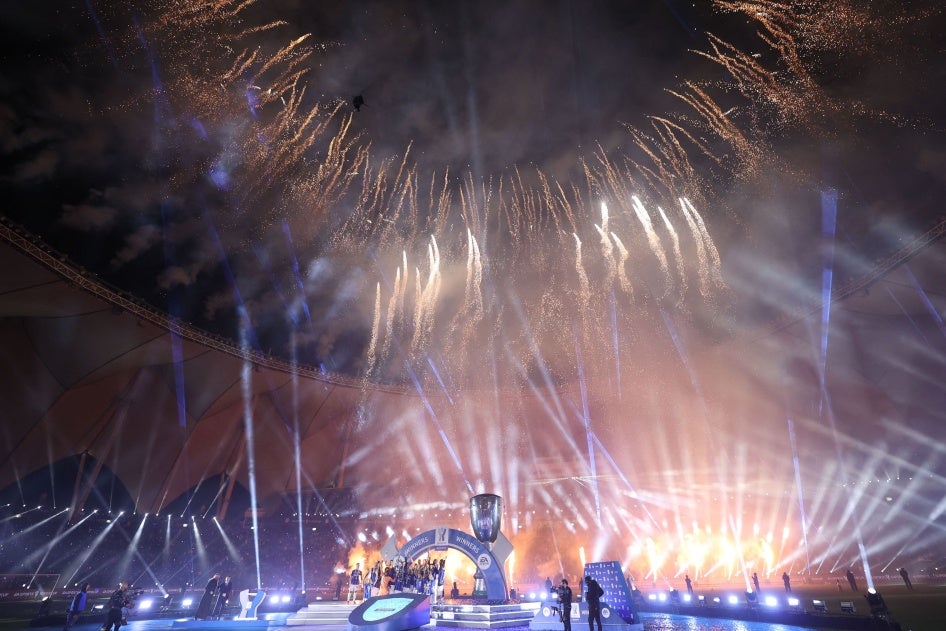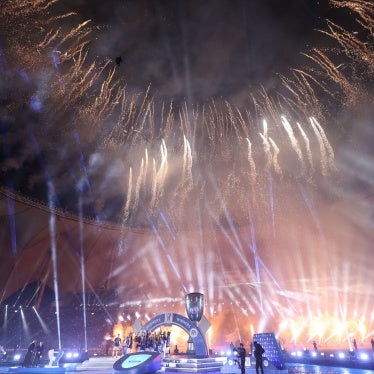(Beirut) – A Saudi court sentenced 12 football fans from six months up to a year in prison on March 27, 2024, for peacefully chanting during a January football match, Human Rights Watch said today. Saudi authorities should immediately quash the verdict, which is based solely on the peaceful expression of exuberant football fans.
Saudi police summoned and arrested the fans after a video of them chanting a Shia religious song during a match was posted and spread on social media. The Saudi Criminal Court in Dammam sentenced two fans to one year in prison with a fine of 10,000 Saudi Riyals (about US$2,666) and the others to a year in prison, with six months suspended, and fines of 5,000 Saudi Riyals (about $1,333). Saudi Arabia is the sole bidder to host the 2034 men’s World Cup.
“Jailing football fans for chants at a match is just one more reason that FIFA’s rigging of the 2034 World Cup bidding process to allow Saudi Arabia to be the sole bidder is not just embarrassing, but dangerous,” said Joey Shea, Saudi Arabia researcher at Human Rights Watch. “How can football fans feel safe in Saudi Arabia if they can be so easily sentenced to prison for nothing more than chants the government doesn’t like?”
On January 24, during a football match between Al Safa Club and Al Bukiryah Club in the country’s Eastern Province, where Saudi Arabia’s minority Shia community is concentrated, a group of Al Safa football fans were filmed peacefully singing a Shia religious song celebrating the birth of Imam Ali, who is considered by Shia Muslims to be the first Imam. Saudi Arabia’s Shia Muslim minority have long suffered systemic discrimination, government hate speech, and violence from the government.
Qatif police summoned and released more than 150 fans for questioning in the days after the match, according to a source familiar to with the case. They detained 12 people, initially holding them in Qatif Prison, and later in Dammam General Prison, the source said.
In court documents viewed by Human Rights Watch, including the list of charges, the police investigation ended with a request for indictment of the defendants under article 6 of Saudi Arabia’s notorious 2007 cybercrime law.
The charge requested for two of the defendants was “sending what can undermine public order using the internet and electronic devices.” Another charge, requested for all 12, was “undermining public order through the spirit of sectarian intolerance by passing sectarian content in places of public gathering and inciting social strife.” Article 6 of the cybercrime law provides for penalties of up to five years in prison and a fine of up to 3 million Saudi Riyals (about $800,000).
On February 3, the Saudi Ministry of Sport announced the dissolution of the Board of Directors of the Al Safa Club due to violations of the country’s basic regulations for sports clubs. The basic regulations allow the Sport Ministry to dissolve a club’s board of directors if it “commits … practices or actions that are inconsistent with public order, public morals, or regulations.” The Sport Ministry then put Ahmed Mohamed al-Sada in charge of the club’s affairs.
On February 4, the Discipline and Ethics Committee of the Saudi Football Federation found that Al Safa Club fans had violated the Federation’s discipline and ethics regulations and fined the club 200,000 Saudi Riyals (about $53,325). The ruling also barred the public from attending the next five home games of the Al Safa Club.
The Saudi government has spent billions of dollars to host major sporting events as an apparently deliberate strategy to deflect from the country’s image as a pervasive human rights violator, and its investments in football are astronomical. In October 2021, the Premier League announced the sale of Newcastle United to a business consortium led by Saudi Arabia’s Public Investment Fund (PIF), a government-controlled entity implicated in serious human rights abuses.
On October 31, 2023, Saudi Arabia became the “sole bidder” to host the 2034 men’s World Cup, when Australia, the only country with a potential competing bid, dropped out. FIFA, the international governing body for football, will certify the World Cup award at meeting in 2024, but there little doubt of the outcome with only one candidate. Saudi Arabia has recently hosted the men’s Club World Cup, the Spanish football Super Cup, and the Italian equivalent.
Human Rights Watch has long documented that some Saudi state clerics and institutions incite hatred and discrimination against the country’s Shia minority. Crown Prince Mohammad bin Salman has tried to appeal to the country’s Shia minority, including neutering the country’s once-powerful religious establishment, and making changes to the 2018-19 Saudi school curriculum to remove some anti-Shia images and rhetoric. But some of the worst abuses of Shia citizens and their ability to practice their religion remain unchanged.
“Any sports institution, musician, or global entertainer needs to ask themselves a serious question before they perform in Saudi Arabia,” Shea said. “They should ask themselves whether their own fans might be arrested if they chant something the government doesn’t like.”









